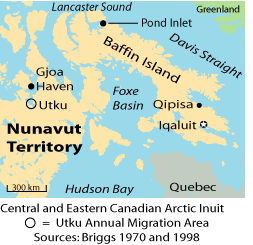The oil blowout catastrophe in the Gulf of Mexico over the past two weeks has serious implications for coastlines worldwide that are threatened by offshore drilling and the possibility of similar disasters. Many Inuit are deeply worried about their future livelihood as they watch news about the drama unfolding off the coast of Louisiana. They worry about the Arctic coast of North America, already the scene of oil exploration activity. Fishing and hunting for marine mammals are still essential economic activities for them.
This summer, the Geological Survey of Canada is planning to do undersea mapping for oil and natural gas fields in Lancaster Sound, a large channel just to the west of the northern tip of Baffin Island, in Canada’s Nunavut Territory. Opponents of the exploratory mapping argue that the undersea air guns, used to perform the seismic mapping, will harm the huge numbers of marine mammals in the area.
 Inuit spokespersons are not keeping quiet. Abraham Kublu, the mayor of Pond Inlet, a village at the northern end of Baffin Island, condemned the idea of drilling in Arctic waters. Global warming, he says, is increasing the numbers of icebergs in the seas, and the currents are too strong for safe drilling. The Canadian government is spending large amounts of money in the search for oil and other minerals in the Arctic.
Inuit spokespersons are not keeping quiet. Abraham Kublu, the mayor of Pond Inlet, a village at the northern end of Baffin Island, condemned the idea of drilling in Arctic waters. Global warming, he says, is increasing the numbers of icebergs in the seas, and the currents are too strong for safe drilling. The Canadian government is spending large amounts of money in the search for oil and other minerals in the Arctic.
In December, Jim Prentice, Environment Minister in Ottawa, initiated a feasibility study aimed at creating a national marine conservation area in Lancaster Sound. Prentice said, when he announced the feasibility study last winter, that the prospect of increasing marine shipping through the northwest passage requires the government to safeguard the Arctic region and to protect its “most special natural features.” Canadian conservationists and the Inuit are concerned that different federal government ministries may be acting at cross purposes over the issue of protecting Arctic waters.
Parks Canada, the agency that manages Canada’s national parks within the Environment Ministry, describes Lancaster Sound as “one of the richest marine mammal areas in the world.” Huge numbers of beluga whales, bowhead whales, and most of the world’s existing population of narwhals summer in the sound, as well as perhaps 50,000 harp seals. Large numbers of polar bears and huge colonies of sea birds also nest and thrive there.
Christopher Debicki, an official with Oceans North, an environmental group, met with many Inuit last week to discuss the implications of offshore oil drilling in the Arctic. Speaking from Pond Inlet, he described the Inuit opposition: “From their perspective, a blowout of the kind we’ve seen now off the coast of Louisiana would be absolutely devastating in Lancaster Sound.” The press secretary for Minister Prentice did not respond to requests for comments.
Pond Inlet Mayor Kublu believes that the federal government has not consulted local people before making plans for development. He also argues that the government has not provided equipment or trained people to handle potential spills. Mayor Meeka Kiguktak, from Grise Fiord, a community still farther north than Pond Inlet, and Jaypatee Akeeagok, another Inuit leader in that town, say that do not have much faith that government regulators will protect the environment as energy prospecting continues. They point to environmental problems that have plagued the Alberta tar sands development as an example of the way exploiters ruin natural ecosystems. “The proposed seismic activities and resource development in our pristine Arctic habitat is tainted by the Alberta footprint,” they write.
In the Beaufort Sea, part of the Arctic Ocean to the west of Nunavut, oil companies are trying to get the government to modify regulations that require drillers to put in safety relief wells when they develop oil fields. Such relief wells might help avert disasters, such as the one in the Gulf of Mexico. The oil giants are asking the National Energy Board to suspend the regulations. There are currently no wells in active production in the Beaufort Sea, but many exploratory wells have been drilled and at least 53 oil and natural gas fields have been identified.
Prime Minister Stephen Harper is playing his politics carefully, trying to say the right things. “As we’ve said before, the National Energy Board is clear: there is no drilling unless the environment is protected, unless workers are protected,” he said at the beginning of last week. “That is the bottom line and this government will not tolerate the kind of situation we see in the Gulf of Mexico.”
A liberal member of parliament, Larry Bagnell, criticized the government’s energy development activities and its “aggressive plans to drill for oil and gas in our most ecologically sensitive Arctic regions.” “There should be a moratorium on oil and gas leasing in the Beaufort Sea and Lancaster Sound until we know the risks related to drilling in the Arctic,” he said. At least some of the politicians are listening to the Inuit, whose way of life would be seriously affected, if not destroyed, by a major oil spill or blowout.